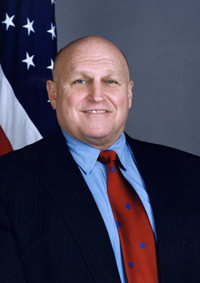Richard Armitage
|
|
Richard Lee Armitage (born April 26, 1945) was the 13th United States Deputy Secretary of State, the second-in-command at the State Department. Previously, he was a high-ranking troubleshooter and negotiator in the Departments of State and Defense.
Armitage graduated from the United States Naval Academy in 1967. Upon graduation, he joined the United States Navy, initially holding the rank of ensign. He served on a destroyer stationed in Vietnam during the Vietnam War. In 1973, Armitage left active duty and joined the office of the U.S. Defense Attache in Saigon.
After leaving Saigon in May of 1975, Armitage came to Washington, DC to serve as a consultant for the United States Department of Defense. However, he was immediately sent overseas again, and served in Tehran, Iran until November of 1976. Following this posting, he returned to the United States and worked in the private sector for two years. In 1978, he began work as an aide to Senator Bob Dole, and in late 1980 served as a foreign policy advisor to President-elect Ronald Reagan.
Following this role, Armitage was made a Deputy Assistant Secretary of Defense for East Asia and Pacific Affairs, a very high-ranking post in The Pentagon. He served in this position from 1981 to 1983. In June of 1983, he was promoted to Assistant Secretary of Defense for International Security. While there, he represented the Department of Defense in developing politico-military relationships and initiatives throughout the world, spearheaded U.S. Pacific security policy including the U.S.-Japan and U.S.-China security relationships, managed all Defense Department security assistance programs, and provided oversight of policies related to the law of the sea, U.S. special operations, and counter-terrorism. He played a leading role in Middle East Security Policies.
Armitage left this post in 1989 to serve as a special negotiator for the President on military bases in the Philippines, and as a mediator on water issues in the Middle East. In 1991, he was appointed a special emissary to King Hussein of Jordan. Following this, he was sent to Europe with the title of ambassador; his assignment was to direct U.S. foreign aid to the states that had been formed out of the fallen Soviet Union. He served here until 1993, at which point he entered the private sector.
He signed "The Project for the New American Century" letter (PNAC Letter (http://www.theindyvoice.com/index.blog?entry_id=417960)) to President Bill Clinton in 1998. The letter urged Clinton to target the removal of Saddam Hussein's regime from power in Iraq due to erosion of the Gulf War Coalition's containment policy and the resulting possibility that Iraq might create weapons of mass destruction. The letter's intended purpose of removing Hussein was to protect Israel and other U.S. allies in the region including oil-producing Arab countries.
The United States Senate confirmed him as Deputy Secretary of State on March 23, 2001; he was sworn in on March 26 of the same year. A close associate of Secretary of State Colin Powell, Armitage was regarded, along with Powell, as a moderate within the presidential administration of George W. Bush. Armitage tendered his resignation on November 16, 2004, the day after Powell announced his resignation as Secretary of State. Armitage left the post on February 22, 2005, when Robert Zoellick succeeded the office.
Along with English, Armitage is fluent in Vietnamese. He is also an active bodybuilder.
Reference
- Official State Department biography (http://www.state.gov/r/pa/ei/biog/2991.htm)ja:リチャード・アーミテージ

